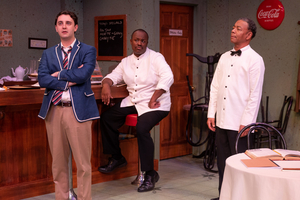Review: 'MASTER HAROLD' ... AND THE BOYS at KC Actors Theatre
 At the heart of Athol Fugard's play is honesty. Not just any honesty - the kind that has been relentlessly papered over by a society-wide conspiracy of lies. The lies of omission, of silence, what Mark Twain called "The silent assertion that nothing is going on which fair and intelligent men are aware of and are engaged by their duty to try to stop". Based on actual situations in his childhood, "Master Harold" ... and The Boys was written partially as a confession, and partly as an explanation. Here is who I was, the play says, and here is why.
At the heart of Athol Fugard's play is honesty. Not just any honesty - the kind that has been relentlessly papered over by a society-wide conspiracy of lies. The lies of omission, of silence, what Mark Twain called "The silent assertion that nothing is going on which fair and intelligent men are aware of and are engaged by their duty to try to stop". Based on actual situations in his childhood, "Master Harold" ... and The Boys was written partially as a confession, and partly as an explanation. Here is who I was, the play says, and here is why.
The play is set in a tea room in 1950 apartheid-era South Africa owned by "Hally's" (Arthur Clifford) mother. Hally arrives from school on a wet afternoon to find only his mother's black servants, Sam (Walter Coppage) and Willie (Khalif J Gillett) present. Mother, it seems, has gone to the hospital to take home his father (Mr. Fugard's mother also ran a tea room, and his father was disabled). Hally, despite his protestations to the contrary, is obviously distressed at having his alcoholic, crippled, and racist father back under the home roof. As the afternoon goes by, the relationship between the white boy and the black men is explored. Cracks appear in the friendly facades maintained by the three, until Hally lashes out, throwing aside the mask of civility and letting out the raw ugliness of the world he is a part of.
Mr. Fugard's skill as a writer is very much evident. He keeps the story moving, slowly building up the tensions and peeling away the genteel facade a layer at a time. We learn much of Hally, and of Willie and Sam: their private lives, their dreams, the unspoken frustrations of trying to be decent people in an inherently indecent situation. A particularly telling point is that Fugard always has Hally become hostile to the others when his father comes up. Hally is, in many ways, the consummate well-meaning "nice guy", full of righteous indignation at injustice, openly friendly to the denigrated minority on a shallow basis, but at his core more a product of his environment and upbringing than he has ever dared to imagine. It is this truth he - and the two men who have tried to, in their own way, mitigate it - is forced to confront.
The performances all around are excellent. We got to see a bit of Mr. Clifford in the Barn Player's The Curious Incident of the Dog in the Nighttime, but it's particularly nice to see him in this role. He really takes a difficult part and does a fantastic job with it. Gillett's Willie is easily one of the most instantly-likeable characters we've seen on stage in quite a while, and is given hidden depths of gravitas by Gillett's measured performance. It almost seems redundant to say Walter Coppage was excellent; his presence in the local theatre scene is of course well known, and he is arguably one of the staples of live theatre in this city.
It is perhaps the cliche of all cliches these days to say that such plays as Master Harold are more relevant than ever. But if a thing is true, it can be forgiven if we keep on saying it. It is so, so easy to think of oneself as "one of the good ones", even while happily partaking in a system that actively attacks the same people to whom you'd call yourself a friend. Anyone can be a fair-weather ally, but when the rain comes down, and the truth comes out, that is when it is time to see who we really are. And we might not always like what we see.
Videos
